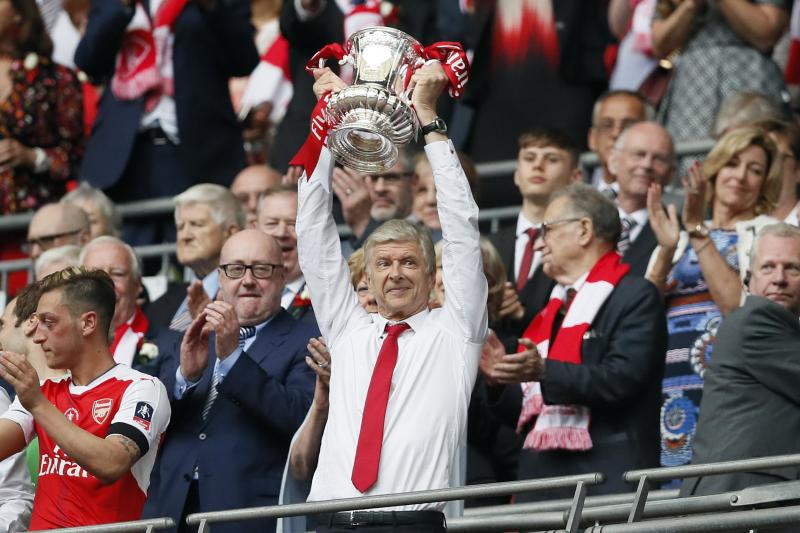Arsene Wenger Announces 2-Year Arsenal Contract After Winning 2017 FA Cup
Arsenal manager Arsene Wenger will stay at the club for two more years after agreeing to a new deal on Wednesday.
Majority owner Stan Kroenke issued this statement on the club’s official website:
“Our ambition is to win the Premier League and other major trophies in Europe. It’s what the fans, players, staff, manager and board expect and we won’t rest until that is achieved. Arsene is the best person to help us make that happen. He has a fantastic track record and has our full backing.”
The Gunners held a board meeting on Tuesday, where Wenger was given a new contract to extend his stay after 21 years in charge.
The Frenchman also issued a statement in the club release:
“I love this club and I am looking forward to the future with optimism and excitement. We are looking at what we do well and how we can be stronger everywhere. This is a strong group of players and with some additions we can be even more successful. We’re committed to mounting a sustained league challenge and that will be our focus this summer and next season.
“I am grateful to have the support of the board and Stan in doing everything we can to win more trophies. It’s what we all want, and I know it’s what our fans around the world demand.”
Wenger’s new deal comes after beating Chelsea 2-1 in the FA Cup final on Saturday, their third win in the competition in four years, though Arsenal also finished outside the top four in the Premier League for the first time under him this season and will be playing UEFA Europa League football next year.
The 67-year-old is the longest-serving, most successful manager in the club’s history with 16 honours to his name, comprised of 10 major trophies and six FA Community Shields.
Wenger arrived at Arsenal from Japanese side Nagoya Grampus Eight in 1996, when he took over after Bruce Rioch’s dismissal.
His arrival revolutionised not just Arsenal but also English football as a whole. He introduced new training methods and better nutrition, and he helped pave the way for foreign players and managers in the Premier League.
Under his tutelage, the Gunners adopted an attractive, possession-based passing game, and he made some of the club’s best signings, including the likes of Thierry Henry, Patrick Vieira and Sol Campbell.
Great success characterised his first decade at the club. Arsenal finished in the top two in each of his first eight full seasons as manager, and he guided the Gunners to three Premier League titles in 1997-98, 2001-02 and 2003-04.
The first two comprised league-and-cup doubles, as Arsenal also won the FA Cup on both occasions, while the 2003-04 side went the entire 38-game campaign unbeaten, earning the team their “Invincibles” nickname. Further FA Cup success came in 2003 and 2005.
In Europe, Wenger took the Gunners to the UEFA Cup final in 2000 and the UEFA Champions League final in 2006, though both ended in defeat—the first on penalties after a 0-0 draw with Galatasaray, the latter in a 2-1 defeat to Barcelona after goalkeeper Jens Lehmann was sent off just 18 minutes in.
The former AS Monaco boss also oversaw the club’s transition from Highbury to the Emirates Stadium in 2006.
Aside from back-to-back FA Cup wins in 2014 and 2015 and another this year, Wenger’s second decade at the club differed markedly from the first.
In the transfer market, fans have repeatedly been frustrated by his inability to address glaring issues in the squad and seeming reluctance to spend, with Arsenal’s frugality painting a stark contrast with the likes of Manchester City, Chelsea and Manchester United.
Partially as a result of that, the Gunners have felt the impact on the pitch—they’ve been unable to mount and sustain a title challenge throughout the course of a season, most damningly of all last year, as they failed to trouble Leicester City despite all their usual rivals struggling.
Arsenal’s seasons have adopted a familiar cycle in recent years, with the Gunners’ title hopes fading in the winter or early spring before making a late charge to secure Champions League football.
Europe has been a similar story, with the club crashing out of the Champions League at the last-16 stage for seven years running, most recently after being humiliated 10-2 on aggregate by Bayern Munich.
Receiving such thrashings—which would be almost inconceivable to the likes of United or Chelsea—have also been a hallmark of Wenger’s tenure of late, including an 8-2 defeat to the Red Devils in 2011 and a 6-0 defeat at Stamford Bridge in his 1,000th game in charge in 2014.
His struggles at Arsenal—who lost in the 2007 and 2011 League Cup finals to Chelsea and Birmingham City, respectively—saw him branded a “specialist in failure” by bitter rival Jose Mourinho, and to some that may be how he will be remembered.
Indeed, many Arsenal fans could well be disappointed by the news of his staying on, though there are some silver linings, a substantial one being the Gunners’ remarkable success in the FA Cup of late.
Even if he was perhaps a little slow to adopt the system, he also successfully transitioned the team to a back three for the final 10 games of the season, winning nine—beating Chelsea and Manchester City in the process—and losing just one of them to Tottenham Hotspur, showing his willingness and ability to adapt his tactics when needed.
With Wenger now tied to the club’s future once again, it’s imperative he makes strides in the summer to improve his team with the minimum goal of getting back into the top four next year, and more importantly to sustain a challenge for the Premier League title throughout the season to break their usual cycle.
Bleacher Report

